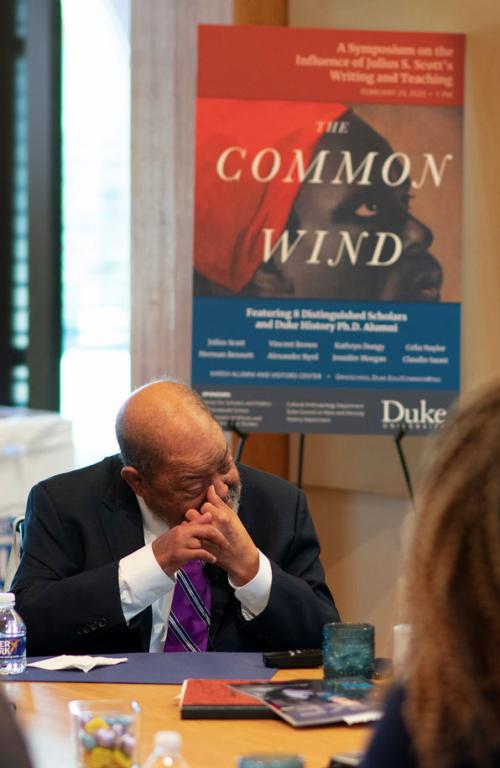

By John Zhu
One after another, they took their turn at the mic—seven Duke history Ph.D. graduates, now all established scholars. One after another, they unspooled memories and introspection on how the guest of honor, Julius Scott, had shaped their lives and careers.
To Alexander Byrd, Scott was his first history professor and his first Black professor. To Jennifer Morgan, he was the Ph.D. adviser who gave voluminous feedback, even long after they had both left Duke. For Claudio Saunt, he was to Atlantic history what Duke Ellington was to jazz. For Vincent Brown, he expanded the boundaries of what history could be. Kathryn Dungy reveled in the scholarly community he built around his armchair. Celia Naylor remembers her surprise and delight at seeing her home island’s history and people featured in chapter one of his seminal work. Herman Bennett has a copy of that work on every laptop he has ever owned.
The seven scholars were speaking at a February 29 symposium at Duke. The Graduate School and the Forum for Scholars and Publics hosted the event to celebrate Scott (Ph.D.’86) and his book, The Common Wind: Afro-American Currents in the Age of the Haitian Revolution. (See photos and a video of the event)
The participants all pursued their Ph.D. at Duke in the decade after Scott had finished his, and many were his students and mentees while he taught at Duke from 1988 to 1994. As the mentor listened and wiped away the occasional tear, the protégés recounted what his scholarship, mentorship, and teaching meant to them and to the study of Atlantic history and the African diaspora.

to his former students discuss how he
influenced their careers.
“Scott proffered a vision of the African diaspora that was intellectually critical and personally empowering,” said Byrd (Ph.D.’01), who took Scott’s class as an undergraduate at Rice University, crossed paths with him again as a Ph.D. student at Duke, and is now himself an associate professor at Rice. “In The Common Wind and in his teaching and mentoring, Scott provided a transformative view that centered Black life and politic, and Black know-how and Black tragedy. And it centered those things at different focal lengths—in local, regional, and world history—that were all endlessly stimulating and important.”
Scott, who has taught at various institutions in his career, said he always looks back on the years he taught at Duke with “a special wistfulness,” which he attributed to his former students.
“You all really were the salt of my life for many years,” he said. “I’m glad to see so many of you have become so important and successful in the profession you have taken up.”
Scott’s book is based on his dissertation of the same title, which traces the flow of information among slaves, sailors, and freed Blacks during the Haitian Revolution. Before it was finally published in 2018, the dissertation spent three decades as an underground hit among historians, as a bound manuscript on the shelf in Scott’s office, and as a Duke library item that was perpetually unavailable.
“A lot of people talked about how difficult it was to get the copy of Julius Scott’s dissertation out of the library, and that was because we were all passing it around like an underground mixtape,” said Brown (Ph.D.’02), now a professor at Harvard. “It was a historiographical deep cut that we all needed to hear.”
Since its publication, The Common Wind has received positive reviews and won the 2019 Stone Book Award from the Museum of African American History. Scott said he has been surprised and heartened by the reception.
“Picking up various trade publications and seeing my book being reviewed with all kinds of great and wonderful things—they were saying those things about us, not just about me,” he told his former students at the symposium. “They were saying those things about all of us.”
In between describing The Common Wind with words like “prescient,” “redefining,” and “transformative,” the symposium participants also recalled how Scott helped cultivate a community of like-minded scholars of Atlantic history while he taught at Duke.

to 1994, coinciding with an intentional effort,
led by Jacqueline Looney (left), to recruit more
Black Ph.D. students.
The participants had come to Duke at a time when The Graduate School was making an intentional effort, led by Senior Associate Dean Jacqueline Looney, to recruit and support more Black Ph.D. students, an effort that later earned an Equity Award from the American Historical Society.
“During that period, we had the perfect mix,” Looney said. “We had amazing students who were drawn to the kind of work our faculty members were doing, a department that was committed to recruiting more Black students, and mentors and teachers like Julius who challenged them to push the intellectual boundaries of their field.”
Dungy (Ph.D.’00), an associate professor at Saint Michael’s College in Vermont, said she spent much of her first couple years at Duke in the armchair in Scott’s office, reading books that he had given her from his shelf, including The Common Wind.
“He never pushed me out when somebody else would come into the room,” Dungy said. “It became a community of scholars, and we were all working on this project of redefining history. … And we have changed the world. The scholarship that is out there—the paradigm has shifted, and it’s because of The Common Wind, and we’re that wind.”
The Common Wind symposium was organized by The Graduate School and the Forum for Scholars and Publics, with support from the Department of African and African-American Studies, the Cultural Anthropology Department, the Duke Council on Race and Ethnicity, and the History Department.
Photos from the Symposium
If you can't see the photo gallery above, see the pictures in our photo library.
Video of the Symposium